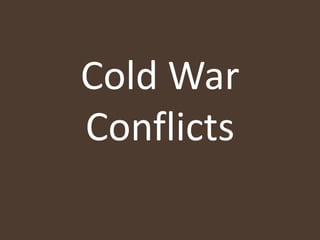Cold war conflicts
•Télécharger en tant que PPTX, PDF•
4 j'aime•2,456 vues
The document summarizes several Cold War conflicts between communist and capitalist nations from 1950 to the 1960s. It describes the division and wars in Korea and Vietnam, where the US and UN supported South Korea and South Vietnam against communist North Korea, China, and North Vietnam. It also discusses the Cuban Missile Crisis of 1962, when the US and USSR came close to nuclear war over Soviet nuclear missiles placed in Cuba. Finally, it notes the competition for influence between the US and USSR in newly independent African nations after World War II.
Signaler
Partager
Signaler
Partager

Recommandé
Contenu connexe
Tendances
Tendances (20)
Causes of the Cuban Missile Crisis – Khrushchev's domestic position

Causes of the Cuban Missile Crisis – Khrushchev's domestic position
HISTORY IGCSE CONTENT - 20TH CENTURY OPTION - USA CONTAINING COMMUNISM - CUBA...

HISTORY IGCSE CONTENT - 20TH CENTURY OPTION - USA CONTAINING COMMUNISM - CUBA...
Middle East in Transition - Lesson 1 - US Interests in the Middle East

Middle East in Transition - Lesson 1 - US Interests in the Middle East
En vedette
En vedette (10)
Cold War: The war that changed the table of international relations

Cold War: The war that changed the table of international relations
Similaire à Cold war conflicts
Similaire à Cold war conflicts (20)
Higher history revision notes - cold war (vietnam and cuba)

Higher history revision notes - cold war (vietnam and cuba)
Plus de 8th Grade - South Carolina History
Plus de 8th Grade - South Carolina History (20)
Cold war conflicts
- 2. Korea After WWII, Korea was divided North Korea was communist South Korea was anti-communist
- 3. Korean War (1950-1953) North Koreans invaded South Korea Supplied by USSR and China who wanted to unite the two Koreas under a communist government The United Nations (UN) sent troops (mostly Americans) to protect South Korea and to stop the spread of communism The Chinese sent troops into North Korea to fight the UN Armistice (ceasefire) signed (1953) The border between North and South Korea was set at the 38th Parallel (38 ۫۫ N latitude) Communism was contained and South Korea remained non-communist
- 4. Vietnam Vietnam was divided (1955) North Vietnam was communist Led by Ho Chi Minh Supported by China and the Soviet Union South Vietnam was anti-communist Supported by the U.S. and France
- 5. Vietnam War (1957-1975) Vietnam War (1957-1975) Viet Cong communist guerrillas tried to take over South Vietnam Backed by North Vietnam, China, and USSR
- 6. U.S. involvement in Vietnam (1960s - 1973) U.S. sent money, weapons, and military advisors to South Vietnam U.S. began sending troops to Vietnam (1964) 1.5 million Vietnamese and 58,000 Americans died Americans were bitterly divided over war Anti-war protests push U.S. to end war U.S. withdrew troops from Vietnam (1969-1973) Communists took over South Vietnam (1975) Vietnam reunited as communist nation U.S. failed to contain communism
- 7. Cuba Cuba was communist Led by Fidel Castro Supported by the Soviet Union
- 8. The Cuban Missile Crisis (1962) Soviet Union brought nuclear missiles to Cuba American spy planes took photos of the missile sites Huge threat to U.S. security! Cuba is only 90 miles away from the U.S. Missiles could easily reach major U.S. cities The U.S. and the Soviets came very close to nuclear war U.S. President John F. Kennedy demanded that the Soviets remove the missiles from Cuba Cuba was blockaded by the U.S. navy until the Soviets agreed to remove the missiles Nikita Khrushchev, the Soviet leader, agreed to remove the missiles as long as the U.S. agreed not to invade Cuba and nuclear war was avoided!
- 9. Struggle for Influence in Africa After WWII, African nations began fighting for independence The United States and the Soviet Union competed for influence in the African countries Gave money and military aid Tried to spread their ideas Some African nations chose not to take sides
